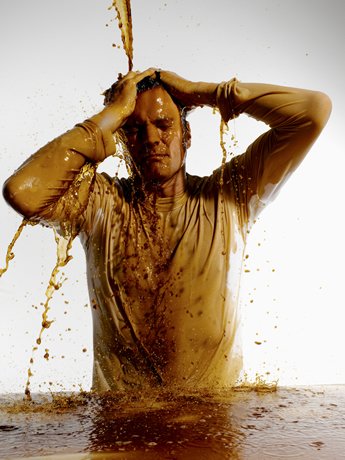There’s
something slightly unsettling about watching Colin
Firth repeatedly spit into a little white sink.
This is
after all the man that made the entire female
British population swoon with his sexy pond plunge as Mr D’Arcy in
Pride and
Prejudice and caused a second pull on our heartstrings as Bridget
Jones’s
constantly perplexed love interest, Mark Darcy. But
here Firth is, spooning brown liquid into his mouth and
squirting it out. And in a few minutes, the 44-year-old actor will be
posing
for pics with a foamy white mouth. It’s
all part of his latest role as celebrity frontman for
Progreso, the world’s first chain of fair-trade coffee shops launched
last year
by Oxfam and Scottish coffee merchant Matthew Algie. Firth
has flown into Glasgow for an afternoon to study up on
his beans at Matthew Algie’s factory and headquarters. The spitting is
coffee
sampling protocol and not unlike the deep sniffing, swirling and
spitting
familiar from wine tasting. Firth hopes this knowledge will come in
handy when
he gets behind the counter this month at Progreso’s site at Portobello
Road in
London. “I’ve
never made an espresso before,” he admits sheepishly.
“I’m going to get a lesson and maybe sell a few coffees.” The
publicity stunt is well timed with fair trade at the
heart of the Make Poverty History campaign, which has been widely
publicised by
Oxfam and leads up to the G8 summit at Gleneagles in July.
Progreso aims to redress the gross imbalance that has
emerged in the coffee industry, which sees a handful of roasters and
multinational coffee retailers raking in hundreds of millions of pounds
while
the world’s 25 million coffee growers typically make 1p on every latte
sold.
The
company buys its coffee from growers’ co-operatives in
Honduras, Ethiopia and Indonesia at a price which covers production
costs. The
co-operatives also own 25% of Progreso, which means they share in
profits; and
a further 25% is ringfenced for investment in disenfranchised growers
that
haven’t been able to set up their own co-operative. The
first coffee bar opened in London’s Covent Garden in
November; and a second in Portobello Road in February. Matthew Algie
was a
natural partner for the venture with fair trade already accounting for
25% of
its coffee sales. It supplies ethical products to Marks & Spencer
and Pret
A Manger and through its long-term contract with Gleneagles will be the
brewing
specialist for the G8 summit. David
Williamson, managing director of Matthew Algie, is
seeking to raise capital for further expansion of Progreso in London
and
eventually for sites in Edinburgh and Glasgow. Firth,
however, has also been part of the venture since its
conception two and half years ago and contributed a five- figure sum to
the
£300,000 used to set up Progreso, along with Matthew Algie and
Oxfam. Why
become involved? “I’m increasingly uncomfortable about
being part of a problem, which is just gross unfairness. We are
complicit.” Until
now, Firth has kept his involvement quiet. This is his
first interview on the subject, and the brown-eyed charmer almost
appears
embarrassed about using his celebrity. He has
arrived in Glasgow with no PR minder or
Hollywood-style entourage and seems terribly afraid of being seen as
“some
luvvy” telling people what to think. In between films, Firth has thrown
himself
into learning about the industry and travelling to Africa to see the
co-operatives first hand. “I
don’t particularly like just being a mouth on a subject,”
he says. “I felt more useful putting some money into it and getting
involved
with the business, so I’m on the board of directors,” he says. “There
are
people I met in Ethiopia, who should be editing newspapers. They are
incredibly
articulate, they have first-hand experience of everything. They’re the
people
that should be speaking, but they don’t get heard. They don’t get
interviewed.
So NGOs are imploring celebrities to come and help. I’ve been doing
this for a
few years and tried to do it quietly, but in the end I realised that
profile is
too useful to leave unused.” Through
Progreso Firth believes he can spread a powerful
message abut the true value of the beans originating from the third
world. As
he sees it, this isn’t about hand-outs; it’s about the right people
making the
money they deserve. In
Ethiopia, Firth visited the Kaffa region and was led
through the forest to the fabled birthplace of coffee. According to
legend, it
is here that a farmer was alerted to the caffeine properties of the
beans by
the hyperactive nature of his goats, which had been munching on the
plants. “This
was the angle they were giving me. That it was exotic
and natural and had a wonderful history,” Firth recalls. “It wasn’t
could you
help us with some money please, can you pay for a clinic, can you solve
our
problems with Aids. They just said: how can we get a better price for
our
coffee. “Someone
said that one of the problems Ethiopia has is that
people perceive it to be a drought-stricken country. It’s not. It’s
lush and
green and opulent in terms of what grows out of the ground. And they
want to be
promoted on the grounds of their quality not on the grounds of their
suffering.” Williamson
believes publicity from Progreso has already had
benefits. It opens doors for the co-operatives to land better deals
with other
countries and it shows high-street retailers that there is a viable
market for
fairtrade coffee. “Our cafe at Covent Garden used to be a Starbucks. Anecdotally we’re doing more business than they used to and the Portobello site is getting busier. But the stores have to be successful because of the quality of the coffee, the staff and the atmosphere. And they are.” |
